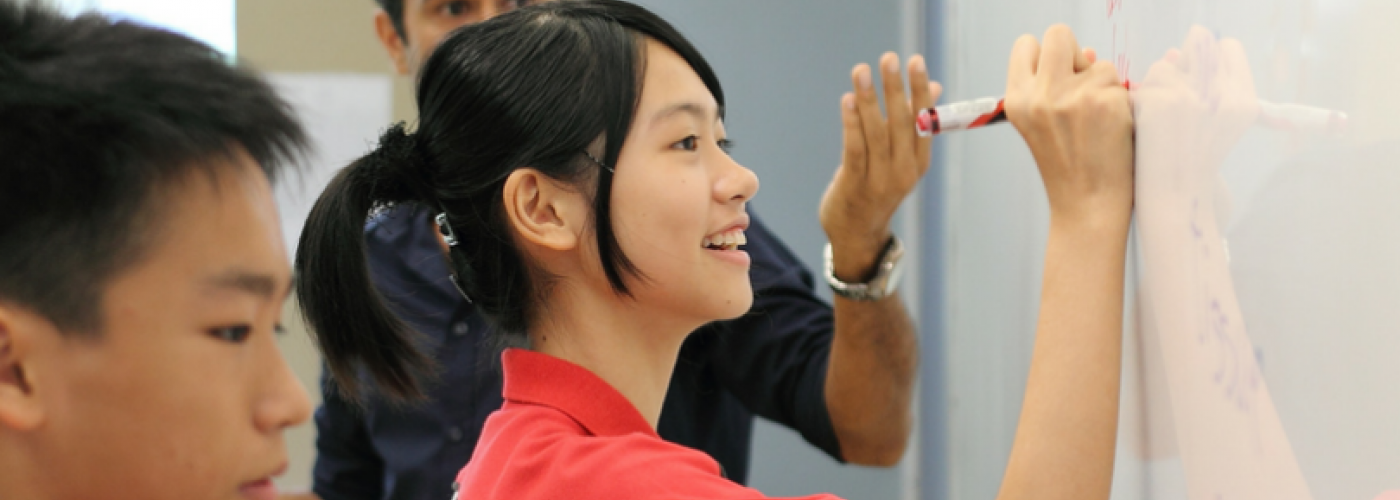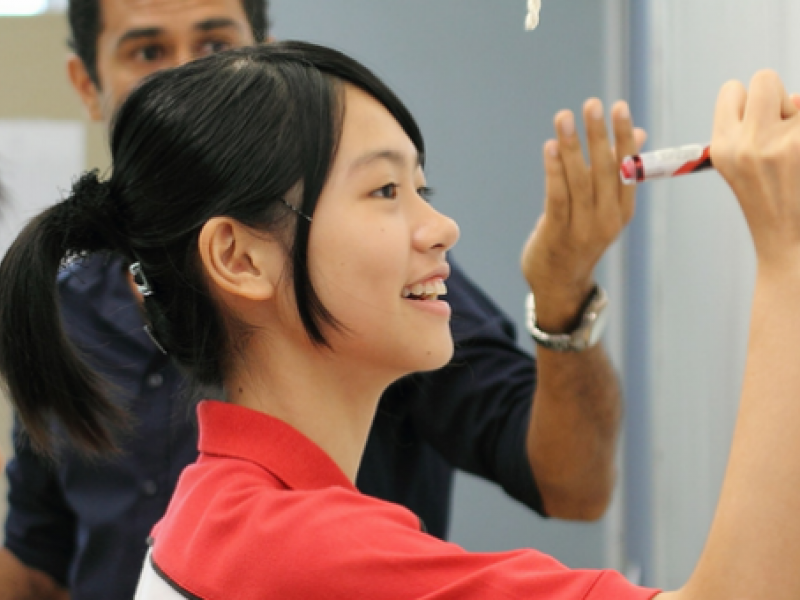11th February 2019
Most young learner teachers will have one of those classroom memories that haunts them. It could be a crying toddler who shouted continuously in want of a parent or another teacher non-stop for an hour. It might be the class of 12-13 year olds you thought were going to lock you in the cupboard if you turned your back for too long. It may be that your early experiences of teaching primary seem more like controlling a crowd at a football match than imparting knowledge and developing skills. The fact is, teaching young learners can often be challenging.
Even after 10 years of classroom experience, teaching young learners is still not without its challenges. I remember my early years of working with young learners being tense, anxious affairs. Compared to teaching adults they seemed quite chaotic and often I was watching the clock waiting for the moment I could go home. Nowadays, I still have occasional lessons that don’t go how I’ve planned, but on the whole my experiences are much more positive than they used to be, and actually, I now prefer teaching primary students to any other age group. When I think of how I transformed from being insecure in my abilities to manage young learners to becoming confident and competent as a young learner practitioner, there are two things that really stood out in my development.
The first thing that really helped was taking a TYLEC course. TYLEC (Teaching Young Learners Extension Certificate) is a course developed by Trinity College London in collaboration with the British Council. The course involves training input on a wide range of young learner-related themes, such as how young learners process language differently to adults; child development and its influence on the tasks we choose in the classroom; classroom management for young learners and different approaches and methodologies that are widely used in the young learner classroom. There is also a teaching practice component where I got feedback on my teaching from experienced tutors. The teaching practice in particular really helped me to set goals in my teaching and to identify areas that perhaps hadn’t been working very well and work on them. I started to implement more routines and classroom management systems into my teaching and I immediately saw results in my classes. The course also had a unit where I observed other experienced young learner teachers. This really helped me to pick up techniques for working with young learners, such as developing my non-verbal cues and giving clearer instructions.
The second thing that has really helped me become a confident teacher of young learners is experience. Like anything in life, we need to put the time in to get good at it. Every lesson that you teach is as much a lesson for you as it is for the learners in terms of what the learners respond well to; what they didn’t respond well to; the activities that increase the classroom energy and those that calm the classroom energy. Through the years I’ve developed my classroom management toolkit and there are 5 key things that have really stood out when it comes to managing my learners:
Using your voice to bring students to attention.
This might sound simple, but actually it is one of the most powerful tools that you have in your teaching arsenal. Anyone who has ever taught is familiar with the concept of projecting your voice, and whilst this is important to ensure that the people at the back can hear you properly, it can actually be a double-edged sword in the young learner classroom. One of the mistakes that young learner teachers make when they first enter the classroom is to keep raising their voices the louder the learners get. What normally happens is that the battle gets lost because the louder you get, the louder the students get and you end up hoarse and war-weary at the end of the lesson. It may sound counter-intuitive but if you are giving instructions and somebody at the back is talking, actually dropping your volume suddenly to a whisper immediately grabs learners’ attention. The same can be said for pitch; most of us tend to get higher when we want someone’s attention, but actually suddenly dropping our pitch can immediately focus learners. The key is playing with your voice a little bit and exploiting variety to your advantage.
Having routines to pre-empt challenging behaviour
My first young learner classes, not long after completing my Cert TESOL, involved lengthy language presentations and lots of workbook exercises. My students would get bored and inevitably act out and I was left wondering what had gone wrong. By observing other teachers and taking the TYLEC course, I learned about routines. Very few children go into class with the specific intention of making the teacher’s life difficult. Quite often, difficult behavior arises because the learners are given unpredictable tasks and they are not sure what to do. I started trying out some simple ones, such as a hello song and welcome routine and I noticed straight away that my learners were calmer and in the right head space to learn once they had the routine. Later, I built this up into having a “listen to me” routine and some TPR routines to transition between tasks and I noticed that my lessons ran a lot more smoothly. A good practical tip is to brainstorm routines that you could use at the beginning of the lesson, to transition between activities and at the end of the lesson, then later choose a few which suit your group of learners. Try to monitor which ones are successful but keep in mind that learners probably need a few weeks to get used to new routines, so if one is not working, don’t be too quick to dismiss it straight away.
The physical classroom space can be your best ally
Throughout history, many battles have been won simply due to one party fighting on home territory. The classroom is your territory and you should use this to your advantage. It took becoming a teacher of very young learners (2-6) for me to really appreciate the influence that the classroom space has on children’s behaviour. Children are naturally curious and like to be in interesting spaces. Unfortunately, most language learning centres are not designed appropriately for young learners and tend to be Spartan spaces with rows of desks and chairs and blank white walls. I was lucky enough to teach in a purpose-built early years centre with child-size furniture, space for physical activities and lots of interesting resources and toys and I witnessed the effect it had on my learners in terms of increasing their motivation to be sharing the space with me. If you are not in a situation to provide that for your learners, try to think about what you can do with your environment. Consider how the seating can be adapted to the activities you are doing, for example if you are doing drama, make sure there is a big space somewhere in the room. Try to have students seated in different zones for different types of activity to vary their position so they don’t get bored. You may not have a beautifully decorated classroom, but could your learners take ownership of the space by making posters or crafts? Plan how learners are going to be seated at different stages during the lesson and this will help you to avoid certain classroom management problems, such as having a distracted learner who is always at the back distracting everybody else.
Rapport: your hidden weapon
Striking up a rapport with your learners is important. No, you’re not going to be “best friends” with them, but it’s important they think you enjoy being their teacher and you aren’t counting down the seconds until you can get out. In my early interactions with my first pre-teen classes I taught, I was overly strict with some of my learners, handing out harsh punishments (extra work, phone calls home) and showing anger as soon as they broke the rules. Quite quickly, the rapport crumbled and I learned the hard way that when children feel like you don’t like them, it is almost impossible to resuscitate the dying corpse of the teacher-student relationship. To build rapport, try to take an interest in your students’ lives. Ask them about their hobbies and what they did at the weekend and remember what they tell you so you can bring it up again at a later date. Try to use positive reinforcement rather than only picking up on the negatives and if you need to deliver consequences, try to do it calmly without showing anger. Quite often once you get angry, children can perceive this as a weakness and the battle is lost.
Consistency is key to breaking down barriers
When you ask most adults what they remember about a favourite teacher from school, a lot of them say, “he /she was very fair”. Children appreciate fairness because they know where they stand. Being “fair” involves treating all students with the same amount of respect and holding everybody accountable to the same standards. Children should be aware of what the rules are and what the consequences are for breaking rules. Along with being fair, staying consistent with your classroom cues and routines also gives the lesson a sense of predictability which helps the learners to feel secure in the classroom.
Classroom management is something that needs to be worked on every single day. There is no magic bullet that is suddenly going to make it easier but over time, with the right training, development and reflection on your own teaching practice, you can learn to stand tall and be proud of your relationships with your students.
If you would like to learn more about teaching young learners, sign up for one of our upcoming Young Learner centered training workshops.



